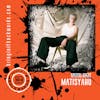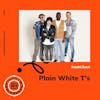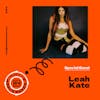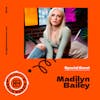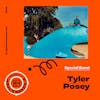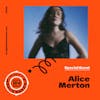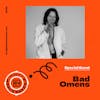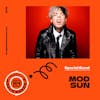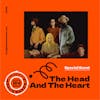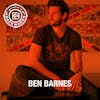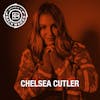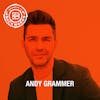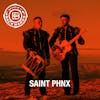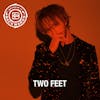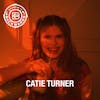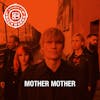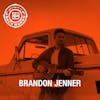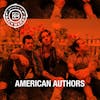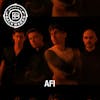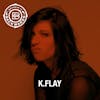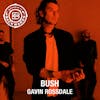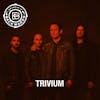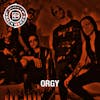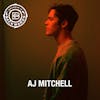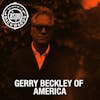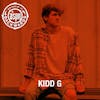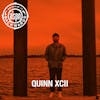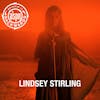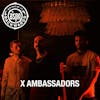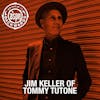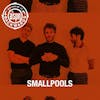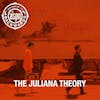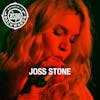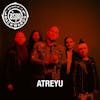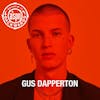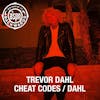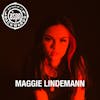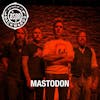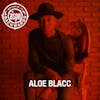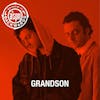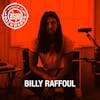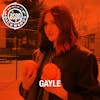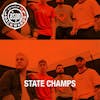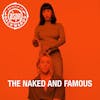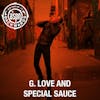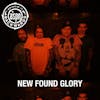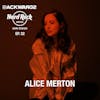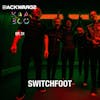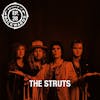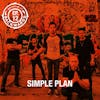Interview with Charlie Rosen
We had the pleasure of interviewing Charlie Rosen over Zoom video.
Charlie Rosen, an experienced Grammy Award and Tony Award-winning composer, multi-instrumentalist, orchestrator, and music director. Most recently, Charlie received a Tony Award...
We had the pleasure of interviewing Charlie Rosen over Zoom video.
Charlie Rosen, an experienced Grammy Award and Tony Award-winning composer, multi-instrumentalist, orchestrator, and music director. Most recently, Charlie received a Tony Award nomination for his orchestrating work on the Broadway musical A Strange Loop.
A Strange Loop garnered 11 Tony nominations and 2 Tony award wins, making it the most-nominated show on Broadway this year. The momentous musical follows a Black and queer young artist at war with a host of demons — not least of which, the punishing thoughts in his own head — in an attempt to capture and understand his own strange loop.
Charlie got involved with A Strange Loop after working as the Music Supervisor and Orchestrator for Be More Chill. He has the ability to act as a chameleon with music and fit into any situation he is brought into and once he started working on A Strange Loop, he collaborated with the show’s composer, Michael Jackson heavily. Charlie can be analytical about sound because he has been interested in so many different styles and genres of music since childhood.
He stepped into the role as orchestrator with a group of six musicians already selected. With such a small group of musicians, Charlie pushed for the orchestration to be clear and flow well, while also letting the musicians use some of their own voice so each show could provide a unique experience to the audience. He aimed to deepen the impact of the musical journey of the show through fully realized choices of genre, tone, color, and instrumentation.
Charlie is currently working on orchestrating the upcoming Broadway musical Some Like it Hot. Other projects he’s worked on range from a number of Broadway hits, including Prince of Broadway and American Psycho.
We want to hear from you! Please email Tera@BringinitBackwards.com.
www.BringinitBackwards.com
#podcast #interview #bringinbackpod #CharlieRosen #AStrangeLoop #TonyAwards #TonyAwards2022 #TonyAwardWinner #NewMusic #zoom
Listen & Subscribe to BiB
https://www.bringinitbackwards.com/follow/
Follow our podcast on Instagram and Twitter!
https://www.facebook.com/groups/bringinbackpod
We'd love to see you join our BiB Facebook Group.
Hello, it is Adam. Welcome back to bringing it backwards. A podcast where both legendary and rising artists tell their own personal stories of how they achieved stardom. On this episode, we had a chance to hang out with Charlie Rosen over zoom video. Charlie was born and raised in Los Angeles, born into a very, very musical family. Both his mom and dad are musicians. He started playing piano at three very early on Charlie's parents realized he had perfect pitch. His dad has a perfect pitch. His dad's mom, I believe has a perfect pitch, which basically means he can hear something and immediately go to the piano and be like, okay, that was this ding crazy. 3 (2m 9s): Obviously he leans into that is obsessed with music, his entire life at around 15, he joined the onstage band for the production of 13, the Los Angeles version of the production 13. Then he moved to New York at 17 for the Broadway debut of 13 as well. So at 17 he's already performing on Broadway. He talked about jumping back and forth between New York and Boston. He was gonna Berkeley taking some classes in Berkeley. Then he'd go back to New York to work on Broadway. He talked about going from not just a player on these Broadway shows, but to the music supervisor positions and the music director and the orchestrator and what all that meant and how he got to those spots. 3 (2m 55s): He told us all about that. He talked about his project, the eight bit big band, which is a jazz orchestra that he arranges all around video game music. And he actually just won a Grammy award for best arrangement for a song from the Kirby superstar video game, which was like a game 25 years ago, which is crazy. He talked about winning a Tony award for Mulan Rouge and he's currently up for another Tony award, which we might know the results of when this episode comes out, but he's up for a Tony award for best orchestrations, for a strange loop, which is the show he currently works on. He can watch our interview with Charlie on our Facebook page and YouTube channel at bringing it backwards. 3 (3m 40s): It would be awesome if you subscribe to our channel like us on Facebook and follow us on Instagram, Twitter, and TikTok at bringing back pod. And if you're listening to this on Spotify, apple music, Google podcast, it'd be awesome if you follow us there as well, and hook us up with a five star review, 4 (3m 58s): We'd appreciate your support. If you follow and subscribe to our podcast, wherever you listen to 3 (4m 3s): Podcasts, we're bringing it backwards with Charlie Rosen. First off, congratulations on yet another Tony nomination. 5 (4m 11s): Thank you so much. 3 (4m 13s): Yeah, that's coming on Sunday. I didn't realize that it's like you, you know, very soon 5 (4m 19s): I know a few days away. And the craziest thing about it is because of the pandemic, the last Tony awards was less than a year ago. So it all goes well, right? Yeah, it was in September. Like the, they combined 20, 20 and 2021 Tony awards in September. This just last September. 3 (4m 36s): So 5 (4m 36s): There is a, there's a slight chance that I might be, I might have won two tos within the course of a year, 3 (4m 41s): One year. Yeah. That'd be crazy. 5 (4m 43s): That's pretty crazy. Pretty 3 (4m 45s): Awesome. So awesome. But again, yeah. Thank you so much for doing this. I'm I'm super excited to watch the Tonys and see yeah. If you got another one, I mean, that's incredible. 5 (4m 55s): Yeah. It's gonna be a lot of fun and in between them, I wanna Grammy. So Hey, it's been quite a year. 3 (4m 59s): Oh, I know. I wanna talk to you about that as well. Quite a year for sure. Oh, awesome. So born and raised in LA, is that what 5 (5m 7s): I read? That's right. 3 (5m 8s): Okay. Tell me about that. Where are you? 5 (5m 9s): Where 3 (5m 10s): Are you? I'm I'm in Nashville now, but I'm originally from San Diego. I lived in San 5 (5m 13s): Diego for 3 (5m 14s): Pretty, basically my whole life. It's been a handful of years in San Francisco working and then back to San Diego and then my family and I, we moved to Nashville about a year and a few months ago. 5 (5m 24s): Oh, okay. Nice. Do you like it? I've never been. I've always wanted to go. 3 (5m 27s): Absolutely love it. Yeah. I mean, coming from California and just being, I was honestly like the most terrified I've ever been my life. I like such bad anxiety. I'm like, are we making the worst decision ever? Yeah. Yeah. And then I love it here. 5 (5m 41s): Absolutely love 3 (5m 42s): It. Yeah. 5 (5m 43s): I love that. But yeah, 3 (5m 44s): It's different change of pace, but it's, it's amazing. 5 (5m 47s): Right. That's cool. And you know, I was born and raised in LA, but I actually prefer New York. 3 (5m 53s): Well, that's even more fast pace. 5 (5m 55s): I know. Yeah. It's a lot more exciting, but yeah, I was born and raised in LA and my parents are both musicians. My mom is a bassoon player and plays all sorts of woodwind instruments and is a teacher in schools and a, and a classical musician primarily. And my father is somewhat of a jazz musician and plays Oregon and keyboard and little guitar and banjo and accordion and all sorts of weird things. And the craziest thing is my house in Los Angeles. We have a pipe organ built into our house, cuz my dad's 3 (6m 22s): Sort 5 (6m 22s): Of, yeah, it's wild. My dad's sort of like passion in general as being like a silent movie theater organist. So he accompany silent movies on the organ, like they used to do in the days before talkies, you know? Yeah. Yeah. So I grew up around that a lot. So yeah, parents are both musicians and they didn't force me into music or anything, but I always just gravitated naturally towards wanting to explore and play and stuff. And, and luckily I was born into a family that was very supportive of that. Yeah. And then when I was 17, that's so interesting. I moved to New York. 3 (6m 50s): Yeah. Wow. Okay. Real quick. I wanna back up here for a second. Yeah. So the house you grew up in had in Oregon, like tell, tell me about how this works. So it's you said it's into the house, built into the house. 5 (7m 1s): Yeah. So what we did is like we bought some property in, in the valley in Chatsworth, which is San Fernando valley slightly, you know, in LA county, but like the suburb of LA and they built like a small building in our backyard from the ground up to house, this pipe organ. And so it's like a specific house for the pipe organ, but it also served as like a recording studio growing up and a rehearsal studio growing up. But the point of it was to set up chairs in there and pull on a projector screen and show silent movies and, and the organ is installed in this building and my dad would play the organ and all the pipes are up behind a wall and yeah. So this crazy, huge 3 (7m 38s): Instrument, it's so crazy. 5 (7m 39s): Yeah. It's very wild. 3 (7m 40s): Do they still live there? 5 (7m 41s): They still live there. It's all there, Oregon. Is there everything's there? 3 (7m 44s): I was gonna say they sold it. That'd be such a bummer. Hopefully they would sell it to somebody that also appreciated the fact that it's there. 5 (7m 52s): Yeah. There's very few of them left in the world. So you know, this is definitely one of the, one of the last remaining operational silent movie theater organs in existence. It's pretty cool. 3 (8m 1s): That's incredible. So did he do that as a hobby or was he doing that professionally as well? 5 (8m 6s): Well, you know, somewhat professionally. I mean the truth of the matter is, you know, in the 20th and 21st century, the late 20th century, there's not a lot of work for a silent movie organist too. 3 (8m 16s): Right. I don't know. Maybe he did like scoring or something from there. 5 (8m 19s): No. Yeah. He just, he became a lawyer by day because he just really wanted to play silent movie music. That's just what he wanted to do. But obviously that doesn't make a ton of money. And so he got, he became a lawyer. 3 (8m 28s): Okay. Smart move. Yeah. Oh, wow. Cool. So you obviously grew up with music. What was the first instrument you learned? How old were you when you started playing? 5 (8m 39s): I started playing piano at age three. 3 (8m 41s): Oh 5 (8m 41s): My gosh. Kind of crazy story. My parents discovered that I have perfect pitch, very young because that's awesome. At around age three, I was able to recognize which notes on the piano were white or black. I didn't know anything about music theory, but I could like identify them based on their color with accuracy. And my dad also has perfect pitch. So it kind of runs on our family. My grandmother on his side had perfect pitch. So all that put together, they were like, oh, okay, he's got it too. It's running in the family, doesn't know note names, but he knows colors cuz he's in preschool and he can tell the difference. So they started me on piano lessons, you know? And then through the years I played some cello lessons, flute lessons. And then eventually, you know, when I was like 10, 11, you start to get into your own music. I really wanted to play guitar and bass and drums. 5 (9m 23s): I wanna be in bands, play rock music with my friends. Yeah. And it just kind of all grew outward from there. You know, I developed an interest in playing brass instruments. I, I play a lot of woodwind instruments cause my mom does. I play a little bit of a ton of different things, but my home is sort of still piano, but I like to say instruments that have necks on them. So, you know, guitar is based man and ukulele, whatever it is, banjo things with necks, necks and 3 (9m 48s): Things with nets 5 (9m 49s): Things. 3 (9m 51s): When you say you had perfectly perfect pitch, does like, could you hear something and then go to the piano and play it? 5 (9m 57s): Yeah. Like if 3 (9m 58s): You were to watch a television show and you could hear like the theme song would play, could you walk right over to the piano as a kid and just play it? 5 (10m 5s): Yeah, definitely. Definitely. 3 (10m 7s): Oh wild. That's so 5 (10m 8s): Cool. Yeah. It's sort of like, I describe it as like, you know, some people can, some people are really good at just, you know, in the same way that people can see a color and say like, oh, that color is blue, that's blue. And then if you take that really far, some people can, you know, clearly see the picture of something in their mind and draw it perfectly on a piece of paper. That's sort of like what perfect pitch is for sound like I can, I can identify and recreate all the notes and sounds that I hear, you know, and then to translate them onto an instrument is kind of a different skill, but something I've also become very good at and developed over time. For sure. 3 (10m 40s): That's so incredible. You're the only, the second person I've ever interviewed that has per 5 (10m 44s): Oh yeah. Who was the first 3 (10m 46s): Now? You're I, I, I, I can remember. I'll 5 (10m 50s): What just curious. Yeah. You know, 3 (10m 51s): I'll know in a second it's yeah. It's the singer from, hold on our lady piece, the singer, his name's rain, he's married. His wife is also professional musician and they have a band together and his wife has perfect pitch, but I can't think of her name right now. Wow. The top of my head it's that many down the line, but she does too. Like she said, as, as a kid, she could hears like, go like watch a television show and then go to the piano and like literally play it right. Without even, and I'm sure you have the same experience. 5 (11m 24s): Yeah, yeah. Yeah. 3 (11m 25s): That's so wild. That's so cool though. I mean, obviously you have to like lean into that and be like, well, I, I have this. I should probably pursue music. 5 (11m 33s): Yeah, yeah, exactly. Exactly. You know, it's sort of worked down it's it's been a really great tool over the years for sure. Especially, especially when I need to learn stuff by ear or play stuff and playing bands or jump in and learn stuff on the fly, learn stuff quick. Yeah. It's been really great. And you know, a lot of people ask, oh, but sometimes it's a curse. Right. I feel like that's the thing people always say is, oh, pretty. So it can be bad though. Sometimes. Right. I've sort of yet to discover how it's bad. 3 (11m 59s): Right. People are always, I've heard that too with people that know music theory really well, or it's like, then you'll hear the person go well then like you can't be as creative cuz you can't unlearn that. It's like, 5 (12m 10s): I disagree. Cause the arguments are always like, oh, well when things are out of tune, it must be really painful. I'm like, but isn't it painful for everybody when it's out? Like, I don't really understand this argument. Some people are like, oh, well when things aren't perfectly in tune, you must be rough. But like that's not true either because there's some amazing classic recordings that we're like recorded. It's slightly the wrong speed. So they're like in between E and F and keys and like that's amazing. And there's microtonal music and the, the whole structure of having 12 notes in a scale is an entirely Western concept anyway. So like it's all relative. I say, you know, haters begun. 3 (12m 44s): I like that. Okay. So you did I read that you were playing in like a show really early, you were like a piano player, you did something like a Broadway style show or that eventually made it to New York, right? Yeah. So 5 (12m 57s): It kind, it's kind of funny. Yeah, exactly. So I got really lucky when I was in high school. I, I didn't know I was gonna do theater. I, I just wanted to play jazz, play in bands and, and play whatever. And there was a show in LA called 13, the musical and I was a software and the gimmick of the show was it was about being in middle school. And so they wanted an all teenage cast, but the composer also felt really strongly about having an all teenage orchestra. He thought that'd be like a really cool and they'd be on stage and they'd say, oh look, these teenagers they're musicians. It's very cool. So I, I did that show when I was a sophomore and a junior in LA. And then when I was a senior, that same theater company center theater group produced like another sort of rock musical. And they asked me to play bass and that those are a year apart. 5 (13m 38s): Then I got super, super, super lucky because the following year after I left high school, that first show 13 transferred to Broadway at a theater called the Jacobs theater. So I got to move here when I was 17 to New York and do that before going to college. And then as luck would have it, the other show that I did when I was a senior in high school, also transferred to Broadway a year and a half later into the same theater wildly enough. And so before I was 20, I had two Broadway shows under my belt. And so that was like a huge foot in the door, obviously into this world that I didn't know I was gonna be in, but sort of fell into and then looked around to the landscape and thought like, wow, this is really cool. This is could be a place for me and what I do and creatively and yeah. 5 (14m 19s): And that was in 2008. So now here we are 15 years later almost and yeah. 3 (14m 24s): Oh my gosh. So at 17 you go to New York, but I did, I, I think I also saw that you went to Berkeley, right? 5 (14m 31s): Yeah. I got 3 (14m 32s): That kind of in that, between area, like, excuse me, just for me, I'm like, where does he have time to do right. These things at such early age. 5 (14m 39s): Again, my circumstances were very, very lucky in that. So I had the, I had this huge foot in the door very early in my, in my career. And then in between shows I would go to Berkeley. So like I, I did the first show. I'd go to, I went to Berkeley for one semester. 3 (14m 54s): Oh, got it. 5 (14m 54s): Got the other gig moved back. And Berkeley was really cool about being like, oh yeah, you gotta take a gig, go do a gig. You can come back. And I did that like three or four times, which is really a great way to go to college for music, kind of, I treated it kinda like a vocational school where in like I did a show, went to Berkeley, learned some stuff, great. Came back to New York, applied that stuff and then looked around and thought, oh, you know what, if I wanna succeed in this business, I should learn some better producing skills, some arranging skills, some more about this style of music. And I would go back to Berkeley and say, okay, I'm gonna take this class and this class and this class, but not these other classes that I don't think I'm gonna need. And I didn't really think I was gonna graduate anyway, which I did not. So I sort of was like, I'm gonna forego some of these classes that I don't think will help me. 5 (15m 34s): Right. So I really got to customize it and tailor it exactly to what I wanted to do in this field. And so I really don't feel like I wasted a single dime on college, which some people can't say, you know, 3 (15m 44s): Right. I was gonna say, you kind of were able to, because you had a gig and you already, that's kind of the end goal. I would imagine if you're gonna Berkeley, right. 5 (15m 53s): Either 3 (15m 53s): Be an artist, get signed to a label, do you know, work in the field that you're trying to, to, to pursue. And you can kind of go back and just grab or more skill sets and then take it back to what you are already doing. Exactly. Did that help you kind of advance in, oh my God. Yes. In your career. 5 (16m 9s): I can't even measure the ways in which my being able to cherry pick courses from Berkeley was helpful in not, you know, cuz I moved to New York to be a musician in these shows, right. Just a musician. I wasn't on the creative team. I wasn't arranging, I wasn't composing. I wasn't. But then looking around from that, inside of that landscape and saying, oh look at these, there's an orchestrator on the show and a composer and a ranger and a, you know, music supervisor, these, all these other positions. And that's kind of where I wanna be. So what are they doing? Like what are they doing? That's so I got to identify like, oh, they're doing this and this and this and this. Okay. I'm gonna go learn how to do that. You know? So it was really tailored and really specific, really helpful. 3 (16m 46s): Was it hard to, to transition out of the, you know, you're a player, they hired you to come play this instrument for this show and then you want to kind of, you know, figure out yeah. How to advance, right? Yeah. You wanna learn how to what's this guy doing? How did, how does this person do this job? And you're learning at Berkeley and you're coming back. Are you able to like, do you have a mentor or somebody that you're able to kind of work with, that's allowing you to learn additional skills and were they at shows and was this happening at shows that you were already working on? Totally. 5 (17m 17s): I mean, I had a lot of, a lot of mentors that influenced me in a small amount, along the way, mostly learning on the job, working with these people. But honestly the thing that really started to set me apart from just being a player was this sort of like emerging new musical scene that I found myself in while doing those shows, I sort of got recommended to play these concerts and, and cabarets and like new music concerts of contemporary musical theater writers just play the bass, usually, you know, or guitar. I got to know all of them. And so, so, and, and seeing that they had needs musically beyond just playing they'd need horn arrangements or they'd need their stuff transcribed into, into piano music, or they would need charts for the band and just going, like, I'll do that. 5 (17m 60s): I'll do that. I'll do that for free. I'll do it for free. I'll do it for free just to begin to like plant seeds as people knowing me as somebody who could function more as just only, not a side musician, you know, who had creative chops in other ways and arranging chops and composing chops. And then the thing that really broke it open for me was I, you know, have always loved jazz and I've always loved large ensemble arranging and composing big bands and orchestras and, and you know, film music and, and broad, big Broadway orchestras of course as well. And so I started a project of my own called Charlie Rosen's Broadway, big band, and we play at 54 below like a Broadway cabaret here. 5 (18m 41s): And we've been, we, I was, I've been doing it for years, but I first started doing it and would, I would call on the Broadway singing connections that I had made. And I take songs from Broadway shows and I would rearrange them and reimagine them for an 18 piece jazz orchestra. And we'd cram 'em all on stage and they would sing. And I got to really just practice my arranging chops and flex my arranging chops and words, sort of spread about that in more and more other musical theater, contemporaries of mine and, and, you know, composers and music supervisors and arrangers and directors and choreographers started coming to check it out and I would invite them to come see it. And it sort of served as both a showcase for me to be like, look, I can do this. And also a laboratory for me to really shed and practice those kinds of skills in a real world setting and learn from my mistakes, see what works, what didn't work. 5 (19m 26s): I would write stuff in musicians would get mad and I'd wanna know why, you know, and stuff like that. That sort of served as my lab for a long time, both as a calling card and something, I love to do a way to meet musicians. I met tons and tons of New York musicians doing that. So, you know, really like the thing people ask is like, what's the thing you did that sort of helped break you through. And I really was like, I came up with a thing, the showcase myself, cuz I sort of realized, you know, people aren't gonna come to you. You really have to go to them or be like, look, check the shit out. I can do this. 3 (19m 53s): Yeah. That's what I was curious about. Like how do you then prove to these other people that are in the industry? Like, look I am, I know you might know me as the bass player and blah, blah, blah, but I can also do all these other things. I have all these other skill sets. Cause I'm, I would imagine a lot of people in the industry can be like, oh yeah, I can do that too. It's like a lot of, yeah, sure. I can do that. But it's like, how do you prove that you can actually do it? And especially at that 5 (20m 17s): Level and when people are gonna spend a lot of money on their album or their show, they sort of wanna have a proof of concept. So I have, I had all this stuff to prove for it. And then after I started doing that, you know, composers and people in the theater would ask me like, oh, can you, you know, arrange some songs for my album? Or like, can you do this one chart for my show? I have an off-Broadway show. And it just, you know, went upward from there. And I started to really get to know some people who are just working on Broadway all the time, composers, you know, I I've been working a lot with like some pretty, some, some pretty more veteran composers in the last like five or six years. And they, they were really mentors for example, I, you know, I, I, I worked, so the person who wrote that show 13 is named Jason Robert Brown. And he did an adaptation of the movie movie honeymoon in Vegas for Broadway. 5 (20m 58s): And he asked me to do a couple of arrangements for that, just a few. And so I was in a room with some other, like really veteran people arranging, like I was, and to hear my music against their music, you know, and have them go like, Hey, you know, what would work a lot better is if you did X, Y, and Z with these horns, or if you did this string stuff here instead, it would really support the singer more. So lots of like learning on the job and, and working with the same people and just having them be like, Hey, you know, this is great, but have you tried this? You know, so it wasn't really ever like one mentor, but just lots of creative feedback and, and constructive feedback from a lot of people over a long period of time. 3 (21m 31s): Okay. So when you're arranging something like that, you have the original piece of music or, you know, how it was originally written and you kind of just hear, okay, I think this section would be cool if you play, if the horns did this and that, and then you're just kind of building, but you're have not the kind of, yeah, it's just 5 (21m 48s): You're right on the money because 3 (21m 49s): Yeah. I'm like, it's just, it's something I don't know a whole lot about. And I'm just so fascinated by here's 5 (21m 56s): The way I talk about 3 (21m 56s): It. That's insane. Like if you get technical mu like music, music, like that's, it's, it's just a different language for me. Then like three power chords in punk rock song. It's 5 (22m 7s): This is really what it boils down to crazy. This is really what it boils down to. You know, we have these terms, ranger, orchestrator, producer, you know, they're all, they all share one thing in common. Sure. These, these, the skill of doing those things is hearing the unrealized potential in a piece of music. And so when you're doing that in a context professionally, it's your job to like be a vessel to support the vision of the original person's music, right? So a composer writes a song, a songwriter writes a song, you talk with them and they say, I'm feeling this vibe, I'm feeling this thing. And then you, as the arranger producer, orchestrator, whatever you wanna call it, you, you hear the unrealized potential based on years and years of listening and experience, you have this bag of tricks, you know, this, this vocabulary and you say, okay, you want this, it's sort of this genre what's. 5 (22m 58s): And, and, and what it is is to have a really analytical mind to pick apart the genres and go, like, what makes what's the DNA of the genre that we're going for? What instruments does it use? What melodies does it use? What rhythms does it use? What cords does it use? You know, how, how advanced or simple, how loud, how soft, how thick, how thin, what colors and that's really what it boils down to. And then the technical stuff, obviously you need more and more technical ideas. The bigger the arrangement is, and the more instruments you have, but on a conceptual level, it really is like hearing unrealized potential and being somewhat of a dramatist and going, okay, what's going to what contrasting parameters and colors can I use to bring out the full journey of this musical listening experience over time? 5 (23m 42s): That's what we do. 3 (23m 43s): That's so fascinating. It's so fascinating. And especially to be able to just hear and visual, like, like you said, just see what's going on with sound. It's so crazy to me. I love it. Just being able to break down one piece and then create a whole new added patient of what it, what it is. 5 (24m 2s): Okay. And I do consider it like draw. It is the metaphor I use a lot is drawing wherein like somebody writes a song and they, they draw sort of like, you know, like a figure on, on a piece of paper. And then we're sort of like the Bob Ross, you know of the sure. How about this little cloud here in this tree and this, and we fill in the, where the illustrators, you know, we've a palette of sounds that we've developed based on what instruments are available or what, you know, sounds we wanna use. And just, we just, Bob Ross, the song, you know, 3 (24m 27s): That's amazing. It's kind of what you did with the, the, the project you have a Grammy with, right? With you, you have the, the video game song, the eight bit songs that are very DDD, like, and you're able to build this whole beautiful arrangement around it. 5 (24m 43s): Right. And what's interesting about that is there are now kind of getting into two more global approaches to what it means to be an arranger. You know, so the sort of business approaches in your, in a musical or a movie, or you're working on an album, somebody has a vision and you are there to honor that vision and they have a goal. You see that goal, you help them achieve that goal in a personal project of mine, where I'm in charge. There isn't somebody necessarily telling me what to do. And so it's not just upholding the original vision. It's totally, recontextualizing the vision taking it out of its original context, coming up with a new idea for it, like a new seed. For example, we have a song called still alive from a game called portal, which is sort of like a, sort of an indie pop song. 5 (25m 23s): And I took it totally out of that context. And my seed of an idea was, well, what if Frank Sinatra had played this video game? What would that sound like? You know, so then we swing it. So I get to be really, really creative and playful. Recontextualizing this music and yeah, that's what that project is. And so it's kind of a crazy thing. This Grammy that we won, it's the third time a piece of video game music has ever been recognized in the Grammy awards. And the first two times we're connected with the releases of those games. You know, they're part of the soundtrack, okay. This is the only time when a totally brand new arrangement recontextualizing reinterpretation of a piece of music from a video game has been nominated list. This game came out 25 years ago. 3 (26m 2s): I was gonna say it wasn't on Kirby's dreamland. It was like Kirby, right? 5 (26m 5s): Super Nintendo. Yeah. 1995 3 (26m 7s): Nintendo. 5 (26m 8s): So it's not connected. The thing that's cool about it is it truly just honors the, the genre of video game music as a Canon of music, as opposed to being specifically connected with the release of a game. So it's, it helps bring legitimacy the fact that we have like a great video game, songbook of collective experiences through this body of work, the same way we have the great American song book or film scores or Broadway scores. We have this body of work attached to this media that we grew up with. So now we can reimagine it, reinterpret it. 3 (26m 37s): Yeah. It's so cool. I, I was listening to a lot of those songs earlier today cuz I'm like, I wonder what, and, and I'm going through and I'm fascinated by your, your choices of songs and games. Like you'll have, you know, like super Mario Odyssey or like the some Luigi kind of spinoff game that they had. Like, how were you finding these songs? Like, were they games that you played and were like, oh, that's a really cool song. Like I like what that sounds like, and you kind of jotted it down or just, 5 (27m 4s): You know, play. Yeah. It's half it's half and half. I mean, I grew up a big gamer. I like, I had tons of Nintendo consoles and as a musician, I was always like pretty keenly aware of what was going on in the score. And so it's half just songs from my youth that I experienced and then half, because only one person can play so many games in their lifetime. We have a lot of fans that recommend me soundtracks and stuff. 3 (27m 25s): Okay. 5 (27m 26s): Or games to check out that I wouldn't necessarily have checked out. So I would check them out, listen, the soundtracks and go, this is great. We should, you know, do this. We should do this stuff. Yeah. It's such a, the fan base of video game music is so passionate in a way that I had no idea even existed before I started doing this. So they're very vocal with requests and I, I have a channel on the AIT, big band discord, that's just for requests. So I always peruse that and go, oh, I didn't even know this game existed. How cool. You know? 3 (27m 51s): Okay. Cause I was cur yeah. I was wondering how you found some of these I'm like Sonic the hedgehog three. I mean, okay. Now the typical, like, you know, the Sonic song that have you played. Yeah. Like that's why I, I loved you going to like these deep cuts within each game, which 5 (28m 7s): I had to check out recently cuz I didn't have a Sega growing up. So I had never played it. 3 (28m 12s): Oh, okay. I was gonna say, I, I, I wanna go on your discord and, and throw out a suggestion and maybe you've heard this one before the, the Mike Tyson punch out and Nintendo Mike Tyson punch out when you are going to fight the next bosses. And you're like in the workout thing, there's like you're, you're kind of running and your trainers like helping you, I it's, it's like a transition scene. You don't have to talk about 5 (28m 38s): Goes. 3 (28m 41s): That's cool. 5 (28m 43s): Exactly what you're talking about. 3 (28m 45s): Has anyone done that 5 (28m 46s): One yet? No, but that's a really good idea actually. Okay. That's a great idea. I love that theme. Oh, 3 (28m 51s): That's 5 (28m 52s): So funny. 3 (28m 52s): That was the one I was thinking of. I was looking through I'm like, does he do that one? That's like one that always has stuck out to me as a kid. 5 (28m 58s): Yeah. That's a great idea. That's a really good idea. And he's on the bike, right? He's on the bike. Yeah. 3 (29m 2s): He's riding the bike and then you're like your trainer guys in the corner. Yeah. Yeah. 5 (29m 8s): That's 3 (29m 8s): Great game. Yeah. That's so cool. So what does, was it just love video games and obviously a fun kind of thing that you put together with, with a big, big band? 5 (29m 17s): Yeah, pretty much. I mean, so I was talking a bit about the Broadway, big band, which I had been doing. And then it's actually, I really love telling the story of the origin of the AIT big band, cuz it is very, it's very cool. I, I like took a vacation with my girlfriend to Japan in 2016. Just for fun. Just for fun. We got an Airbnb and Kyoto and on the same block, there was this musical instrument store that had been open for like 300 years. I'm like, wow, that's cool. Wow. That is cool. They sell traditional Japanese instruments. And so I bought an instrument called a shamisen, which is like a traditional stringed plucked string instrument kind of looks like a guitar, but the, the pick looks like a put knife. It's like this big and you hold it like this. Very cool. Oh wow. And I wanted to take a lesson in it while I was there. 5 (29m 57s): So I have a friend who plays in the AIT big man now didn't exist at the time, but he plays a traditional Japanese flute called the Shak hachi and he move, he went there to study that. So I said, Hey man, do you know anybody in Tokyo? I was going to Tokyo the next day that, you know, does this stuff and might wanna gimme a lesson. And he said, yeah, absolutely. He hooked me up with a friend of his, I went to that guy's apartment. We had a lesson. It was very cool. We got along really well. And I saw that he had this really obscure video game music soundtrack on his floor from a series called gun buddy going on, which only one entry came out in the United States of okay. And I'm for the N 64. And I'm like, oh I love, I love gun buddy going on like, oh. And he is like, oh, do you like video game music? And I thought, I guess I've never really said this out loud, but like, yeah, I really do. 5 (30m 40s): Excuse me. Yeah, I really do. And so he said, okay, let me give you something. And he gave me a copy of his album and his album is all video game music arranged for traditional Japanese ensemble. So like classical Japanese music, but they play Megaman and, and all this stuff like listening to it on the plane home, like, man, this is so cool. And just sort of hit me like, you know, I love big bands and I love orchestras and large ensemble arranging. And like I know there are a lot of orchestras playing video game music out there right now, but there's not a ton of like sort of pop orchestra, jazz, big band swing, funk, like large ensemble with soloist and an MC and singers and like good times and improvising and like, you know, like what if the New York pops did an evening of, of video game music as opposed to like straight ahead, like symphonic or like epic metal, which everyone else is doing. 5 (31m 31s): I'm like, I should do that. I should. So I went home and I like started arranging songs from my youth for this band. And after a couple months I went to the studio and recorded our first album. We had 10 songs on it and just thought, you know, I'm gonna do this. See what happens. It's really fun for me. I just love this music. And yeah, I posted videos of it on YouTube and they really just blew up in a really cool way. And as it turns out, there's I tapped into this huge existing fan base and scene, especially on YouTube for video game music covers no idea existed before music festivals for video game music, huge, huge festivals, all this stuff, you know, you know, I'd never been to any conventions that had to do with video games before this. Like I had no clue and it's such a loving community and such a supportive community and yeah, that's how it started. 3 (32m 15s): That's so cool. I've, I've interviewed a couple artists that have made like kind of got really big, their start from like video game channels on YouTube using their songs, like when the people are playing it, which it's fun. It's cool to hear like the other, it's almost like the other side of it. Like they're not running a song for a video game or it's not going in the game, but it's a game or using it that turns into a 5 (32m 38s): Thing that, and I get a lot of like 3 (32m 40s): Teammates with that. 5 (32m 41s): I get a lot of requests from like Twitch streamers, you know, like, can we use your stuff in the stream? And I always say like, yeah, you can, but just, no, I don't technically own the rights to this music, so 3 (32m 52s): Right, right. A little D there, little dicey, 5 (32m 57s): You know, I don't know if you might get taken down but go for it. 3 (33m 0s): Right, right, right. Yeah. So it's, it's interesting to hear and see like your YouTube channel and, and what you have going on with, with that eight bit, eight bit big band that, you know, is kind of the 180 of, of what other, you know, people that I've chatted with have done. Right. Right. In that space. That's at least that's, that's so funny. So you, you scored a gram Tony award and a Grammy award with the Grammy award. Was that something, cause I wanna talk to you about the Tony. What I wanna talk about both of 'em cause then they're coming up here, but with a Grammy, was it something that was kinda outta nowhere where you got nominated or like, what was that like? 5 (33m 36s): I can't tell you how much of a long shot. I really thought this was like random video game music, orchestra soundtrack from 35 years ago. I mean talk about niche, niche, niche, you know, right. I could never, in a million years of anticipate this was gonna happen basically, you know, I'm a recording academy member and so I can vote on the Grammy's and as a recording academy member, you can submit yourself programming. I became it this year. I didn't, I don't know anything about this, but I've, you can do that. And so I did, I thought, okay, you know what? It's a long, it's a long shot, but why not? Why not? So I submitted myself in this category and just, you know, so, you know, like the, the voting happens in two rounds. 5 (34m 21s): And so what we see in the five nominees that's round two. So the first round you narrow it down from like tons of entries. And so for example, the best new album of the year category in round one has 1500 albums, 1500. Wow. Yes. 1500. And so it gets smaller. That's obviously a big one, but the arranging category that I, I won for, I mean, there were 500 things submitted in that category, you know? So it's like 3 (34m 48s): Still, that's 5 (34m 49s): A lot long odds, long, long odds. And so it really just becomes like, you know, how much brand awareness do you have? And luckily there were enough people who vote on the Grammy's that were aware of what we were doing to help us pass round one. When we got to round two and we were at the Grammy's me and this particular track that I won for, I usually do all the arranging myself, but I had happened to collaborate with a friend of mine named Jake Silverman who goes by button masher. There's an incredible chip tune artist. Cool. Yeah. And so he did this sort of original arrangement of it on, on, on chip tunes. And I was like, oh, can I turn that into an orchestra piece? You know? So we worked on it together and we were sitting there and I was sort of like, Hey man, you know, we don't think we're gonna win. 5 (35m 31s): I mean, like there's all these other great nominees and you know, there's the London symphony orchestra and shit like, oh, there's no, it's okay. But it's like, like, Hey, we're sitting here. How cool is that? You know, like it's video game music. That's so niche and it's at the Grammy's. It's very cool. It's a huge day. We're so proud. Then when they said our names, it was just like, boom, like jaw on the floor. We're frozen in place. And my girlfriend was like, you guys gotta go, you gotta Ru go, go on stage. We were like, oh my God, never in a million years, what I have expected this. And it's an incredibly niche thing it's but it really is like, has been huge for the community to help legitimize video game music as its own standalone art form. You know? It's very cool. 3 (36m 7s): It's very cool. It is so cool. That is so cool. And then yeah, to, to actually win and be up there. You, now you have the, it's just what a cool 5 (36m 14s): Story. 3 (36m 15s): Yeah. And with, with then with the Tony award, was you, you were nominated one for that as well for a strange loop, right? That's the one that strange 5 (36m 23s): Loop is this strange loop is this year. So I'm not sure if 3 (36m 25s): Oh, Mullan Rouge was that Mullan Rouge. Okay. Sorry. So Mullan Rouge won. Yeah. What was that like? So you get nominated for that. And what was that mean? You've been doing Broadway since you were 17 years old. 5 (36m 36s): Yeah. Right. So, and you know, and you know, because of that, because I've been doing it for so long and I've like experienced, you know, secondhand, so many Tony awards and been inside of how they work and learned how they work and who gets what and why and what the politics are and all of that stuff, you know, 3 (36m 51s): Behind the curtain look. 5 (36m 53s): Yeah. I know part of me was like, oh yeah, the Tony awards, how can they really know what's good? You know, I don't blah, blah, blah, whatever. Like I was like at age 23, I was like, whatever Tony woods was so jaded, I've done five hours. I 3 (37m 6s): People think that way though, about the Grammy awards they do. Yeah. 5 (37m 9s): But then when it came down, when it came, when we act, when I actually got nominated, all of that was gone. I was like, holy shit. So sure. Like why, so that was, that was incredibly exciting. And there was four of us who were orchestrating that project and we were all doing a piece of the arrangements for that show. And it's, it's really incredible what that music team has pulled off with that musical, because it's just an insane explosion of mashups and remixes and covers. And it's like, it's truly an incredible thing. It was crazy to work on unbelievable orchestra band sounds great. And they, all those people have been my friends for a very, very long time. So they'll like walk up there with them was just really thrilling. 5 (37m 49s): It was really, really cool. It was really, really cool. That is so cool. It felt like I'm gonna be honest with you way better odds than winning a Grammy because it was post COVID and there were just no musicals. Oh, true. I was sort of like, this is incredible. I might win. Like I think based on what I know about the industry and, and what happened and how it was decimated and how little options there are, we deserve to win. But I think I probably, I might win. 3 (38m 17s): Yeah. Well, I mean, and Middleland Rouge is such a, it's a big obviously wall house. Yeah. 5 (38m 23s): It's a powerhouse. The show. Yeah. And the funny thing about orchestrations as a category is sort of like once, if a show starts sweeping the Tony's, if they're giving it Tony's left and right. Generally these sort of smaller design awards, like sound design and orchestration legend design, it just sort of is a pattern that they'll also get those if they're gonna sweep anyway. So once the, oh, they 3 (38m 45s): Will. I figured that maybe go the other other way, like, ah, they've won too many. We're not gonna give 5 (38m 49s): 'em these. No, it's kind of a funny, it's kind of a funny thing. I mean, I think it's a result of the fact that like, even during normal times, not just COVID there just aren't that many shows, you know, there's only let me see, I'm gonna Google search right now. How many, no, go ahead. Broad Broadway theaters are there, there are 41 Broadway theaters, right. And new, some of those don't change shows ever the lion king, you know, wicked, Phantom, those have been there for decades. And so like, there's just not that many new shows that happen every year. And so the ratio of new shows to Tony awards is like, you know, when you look at it kind of a, kind of a small ratio. And so you can, if, you know, if you know, inside the industry really well, it's a lot easier to predict that than the Grammys where people have to sift through 1500 albums to decide, you know what I mean? 5 (39m 34s): Right, 3 (39m 34s): Right. 5 (39m 35s): So it's an interesting thing to see inside of, but that being said, people still have to vote and we still won, you know, by merit and it is truly, truly incredible. We're, I'm thrilled about it. And I, I hope strange loop deservedly has the same F cuz that is an incredible, incredible piece of theater that I'm truly honored to work on seriously. 3 (39m 54s): And that's a newer show, isn't it? So that must even be more difficult to break, to cut through something like Rouge that had to film a company, you know, like it's a name that people recognize, right. 5 (40m 5s): It's a name, it's a name. And, and it had a lot of money and you know, large funding. It's very, it was a big commercial show. And so yeah, I was able to do really well. I deservedly so I might have, 3 (40m 15s): Right. Yeah. No, I'm not saying it. Not taking anything away from it, but you will recognize the name. Like they go, oh, like if somebody said here a strange loop and they put it in like, 5 (40m 23s): What's that, 3 (40m 24s): You know? Yeah. They could either, is that a movie? Is that a song like, you know, it could be a lot of different things. 5 (40m 29s): Totally. And it's funny you say that, cuz it is also the name of a Liz fair song, which it was inspired. It actually that's intentional. Oh really? That's intentional because there was a version it's funny. The show is both new and old. So the show is actually 20 years old. 3 (40m 46s): Oh, is it 5 (40m 47s): The writer of the show it's never been produced, but the writer of the show has been working on it for 20 years. And in one, in one version of the show, all the music was Liz fair songs. 3 (40m 57s): Interesting. 5 (40m 58s): Yeah. That was a long time ago. But the show didn't get produced at all until 2019, even though he had been working on it for a large part of his life, which is so interesting. And it's one of those shows that like, it just doesn't fit to any molds and the writer of the show whose name is Michael Jackson, but not D Michael Jackson. His name is just Michael Jackson. It's like semi autobiographical. And in the show, the main character is named usher and he is an usher at a, at the lion king, which in real life, Michael was an usher at the lion king. So it's like semi autobiographical. 3 (41m 29s): Oh wow. 5 (41m 30s): There's no longer Liz fair songs in it. But her spirit sort of like lives on through it. But it's a show that really like tells its truth. So honestly, and without compromising any language or content in a way that just makes you go like, yeah, this is what the theater needs for me as a jaded, you know, theater person in 2019 was like, well, I love this, this shows great, but it'll never go to Broadway. Nobody would took a chance on this weird show, but you know, the world really finally caught up to the way Michael writes, cuz he's always been writing the way he writes honestly about his life experience and they, the world finally caught up to him and it's really cool. 3 (42m 2s): That is so cool. That is so cool. So that, it's interesting that he was a, an usher. So he grew up in, you know, working in Broadway all while writing this piece that eventually comes out 20, you said 20 years later. 5 (42m 16s): Yeah. Like he wrote it as part of his thesis for his like musical theater writing thesis at NYU, you know, when he graduated and just has been slowly chipping away at it and working it and changing it over the last 20 years, you know, and he's 41 now and now they're producing it and now it's on Broadway and it's nominated for 11 Tony. So it really was, yeah. I was 3 (42m 37s): Gonna say has a ton, right? Like yeah. A ton of nominations. Yeah. Wow. That's very cool. Cool. I mean that, and were you, this is the, it start in 2019, was you the first person that worked on it? 5 (42m 48s): So that is also an interesting story, you know, because this show hadn't really ever been fully produced. It's really not till it gets the producing stage that you fill out a music department and bring on somebody that functions as like the orchestrator to use the formal title. But there was somebody before me who he was the music director and the orchestrator and he was the dear friend of Michael's and they went to school together and sadly he passed away in like early 2019. Yeah. Very sad. Oh wow. Died way too young. It's very sad. We really missed him. He was a really great guy, but that was a few months before the production off Broadway in 2019 was scheduled. And the director of, of strange loop also directed a show that I orchestrated called be more chill, which was in 2019. 5 (43m 33s): So during be more chill, he was sort of like, Hey man, we're scrambling. Like, do you think you could fill in on this show? We, we really need you. I think, I think you have the right vocabulary. You know, the person before you sadly passed away and was ill it's I'm like, oh man, well of course obviously I'm happy to help. And so it's, it's a tragic reason why I got offered the job, but I'm so glad I did because it's really like really a game changing show. Really. I really love it. I really, and I'm, I'm rarely this like, like explicitly enthusiastic about like loving a show, but man, I love this show. 3 (44m 4s): That's so cool. Well, I hope, I mean with 11 nominations, I hope you guys sweep it through 5 (44m 9s): Fingers. Cross incredible 3 (44m 11s): Fingers cross. Yeah, that is so cool. And you also, did you scored a film too here today with Billy crystal? 5 (44m 17s): Yeah. That was cool. Over the pandemic, you know, we shot it in 2019 and then the pandemic happened. And so, you know, normally scoring a film is a very fast and aggressive process, but we got to really take a year's worth of time because of that. Yeah. But yeah, it was very cool. And indie film with Tiffany Haddish was the lead opposite of Billy crystal. And that was, that was so fun. It's a great, it was a great time. He's great. 3 (44m 38s): Was that the first film that you had, like a big budget film like that you had a chance to score? 5 (44m 42s): It was, yeah. Yeah. I had done some indie films for my friends and things here and there, but that was the first time that, you know, sort of a full, a more legitimate production that sort of taken a chance on me after floating around in theater for a long time and scoring stuff in theater, I scored some plays, you know, and things like that. But I got the connection through a composer named mark shaman, who I've been working with and mark scores, Billy's films, they've worked. They've, you know, he's been scoring Billy's films forever. He's scored one Harry Mets. Let me just confirm that. Yeah, he scored. I'm gonna just confirm before I say that. 3 (45m 13s): No worries. 5 (45m 16s): I'm like 99% sure. I can't believe I'm doubting myself. Cause I know that this is true, but you know, I don't want to be wrong. 3 (45m 22s): All good. Isn't the internet. Like I love how so, like you're just like, let me just double check. Like you have five clicks in later. 5 (45m 29s): Oh no. I'm gonna fact check. I'm gonna fact check myself. 3 (45m 32s): That's so good. 5 (45m 33s): Yeah. Mark 3 (45m 33s): Shaman. I love doing interviews this way as well. Cause why not just figure it out. 5 (45m 38s): Yeah, exactly. But yeah. Mark shaman scored like yeah. When Harry met Sally and, and a lot of the Nora Efron movies, but he's also like he composed hairspray and you know, catch can. And Charlie talked like he's, he's a Broadway guy, but also did a lot of films, you know, does a lot of films. So Billy was like, Hey, I have this indie film. It's got kind of a limited budget. Would you be interested in scoring it? And he was like, I don't think I have time, but you should use, you should use this young guy. He'll he'll do it for you. So that's how I met him. 3 (46m 4s): That's amazing. Yeah. That's so is it something that you're interested in doing again, or, yeah. Did you enjoy, because it was your first, like real big, you know, big film that you have the time to do it. 5 (46m 14s): Oh yeah. I loved it. I will absolutely do it again. It's like, it's funny. The difference between composer and arranger or like composer and producer, it's sort of like, you know, if the composer is the architect, the arranger producer, they're like the interior designer, you know, the composer like builds the whole scaffolding and builds the rooms. And then once you arrange and produce a thing, it's like, I'm gonna paint a picture here and this here, you know, that's sort so it's, it's cool to finally be like the architect, you know, and not just, not just the design, the interior decorator, you know? Right, 3 (46m 43s): Right, right. No, that makes a lot of sense. Yeah. I love it. Well, I thank you so much for doing this, Charlie. This has been awesome. I appreciate 5 (46m 49s): It. Oh yeah. Of course. My pleasure. Super fun. Yeah. 3 (46m 52s): I've, it's learned so much cuz this is a world that I've never I've I've only interviewed a handful of people doing what you're doing and yeah. 5 (46m 60s): Have you done any other theater? I was curious there any other theater people 3 (47m 2s): That you've interviewed? Yeah. The guy that did the TikTok musical. He did Chuy Daniel. What's his last name? Mertz 5 (47m 11s): Last 3 (47m 12s): Daniel Merlo I think is, 5 (47m 14s): Yeah, that feels right. I've read his name before. 3 (47m 16s): I can't remember. He did it and there's a couple other people that I just like, not off the top of my head that's thinking of, but yeah. I love it. And I few people that play in orchestra, like a woman who plays bass for the book of Mormon, stuff like that. Oh cool. Yeah. Yeah. So 5 (47m 36s): Nice. Is it, who is that? Is it Alex? Eckhart? 3 (47m 41s): Yes. 5 (47m 41s): Oh cool. I know her really well. 3 (47m 43s): Yeah. I'd have to hear the name. We've published like over a thousand interviews. So it's like, I gotta like coming back to her names. I'm like, oh yeah, that is it. 5 (47m 52s): Yeah. Yeah. Oh, that's cool. I love Alex. She's awesome. 3 (47m 55s): Yeah. So it's been, yeah, it's been fun. It's just a world that not a whole, I haven't had a chance to interview a whole lot of people and I, and I'm so fascinated by it because just the skill that you have to have and just the knowledge into it's like, you know, PhD level degrees and music to even comprehend it, it, or whereas I'll interview a lot of people that just, you know, played guitar in their bedroom for, you know, five, six years and wrote a hit and which is also great at it. We 5 (48m 22s): Also love yeah. 3 (48m 23s): Yeah. No, which I love as well. Don't get me wrong, but it's just like two totally different ads. Totally. The music spectrum there, but I think 5 (48m 29s): It's so cool. Yeah, totally. 3 (48m 31s): Well. Yeah. Well again, I appreciate your time. I have one more question. I wanted to know if you have any advice for aspiring artists. 5 (48m 37s): Yeah. My advice for aspiring artists is like, find a thing that makes you unique, unique, you know, find, find something that you do that nobody else totally does. And then find a way to brand market yourself. I mean, that's just the name of the game. These days find the thing that you do, you do better, slightly better than other people and, and play that up.
Featured Episodes
Here are some great episodes to start with. Or, check out episodes by genre.























